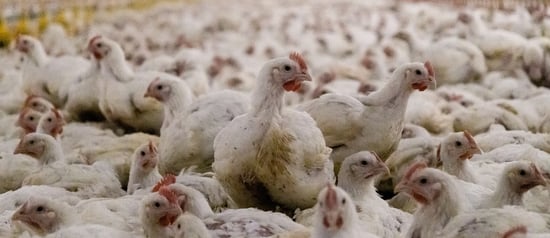
Yesterday, MPs gathered in Westminster Hall to debate the urgent need for food system transformation ahead of the COP30 climate summit, which will take place in Brazil next month.
The debate focused on how the UK government must show international leadership by transitioning away from intensive animal agriculture towards humane, nature-friendly farming.
Factory farming is not only a leading cause of animal suffering but also a major driver of deforestation, pollution, and climate breakdown. Industrial farms keep billions of animals confined in incredibly cruel, cramped an barren conditions. These systems depend heavily oin imported feed crops like soy, much of which is grown on deforested land in South America leading to the destruction of the Amazon rainforest and local ecosystems.
World Animal Protection supported the debate, calling on the government to ensure that food system transformation is a key focus at COP30 and that commitments made at the summit include an end to the expansion of cruel factory farming.
COP30 is a key moment for the UK government to demonstrate bold international leadership.
Factory farming is wrecking the planet and driving deforestation. The majority of animals in the UK are cruelly confined on factory farms. To feed these animals, the UK is importing millions of tonnes of soy sourced from areas at high risk of deforestation. Around 90% of soy imported to the UK is used as animal feed. To meet global climate targets, world leaders must urgently transition from unsustainable factory farming to nature-friendly farming that is good for the planet, animals, and people.
Factory farming is wrecking the planet and driving deforestation. The majority of animals in the UK are cruelly confined on factory farms. To feed these animals, the UK is importing millions of tonnes of soy sourced from areas at high risk of deforestation. Around 90% of soy imported to the UK is used as animal feed. To meet global climate targets, world leaders must urgently transition from unsustainable factory farming to nature-friendly farming that is good for the planet, animals, and people.”
The debate comes as global experts, including the IPCC and Chatham House, warn that without significant changes to food systems, the world will fail to meet critical climate goals. Shifting to higher-welfare, sustainable farming practices can help restore biodiversity, cut emissions, and protect animals while still supporting farmers and producing nutritious food.
A call for a Just Transition
The UK’s food system is at a crossroads. While factory farming continues to grow, forward-looking farmers are proving there’s a better way – one that works for animals, the environment, and farm businesses.
Our latest research shows that raising animals in natural environments like woodlands can produce high-welfare food at competitive prices while tackling climate change.
Find out more about a Just Transition in UK Farming

MPs rallied to support a Food Transformation
We were delighted to see so many MPs take part in the debate and demand the government take action and transition to a food system that is humane for animals and fair for farmers and the environment.
Pippa Heylings MP spoke about how the transformation of food systems is essential for climate action, food security and nature restoration. She also spoke about how this transition must be just, supporting our farmers and animal welfare as we change how food is produced.
Terry Jermy MP discussed how the government sought to protect and safeguard animal welfare and pointed out that animal welfare and the climate crisis are intertwined. He noted that we must do more to support such farmers, with a greater focus on fairness and rewarding those who play by the rules, upholding high environmental and animal welfare standards.
Barry Gardiner MP highlighted the role banks and big meat companies, such as JBS, play in driving the deforestation crisis. He pointed to the irresponsible financing harmful meat companies, causing deforestation, receive from banks.
Call for an end to cruel factory farming
Sign our petition to the UK government and let them know that there is no future for factory farming.
Image credits: Hero image: Pixabay/Pexels
